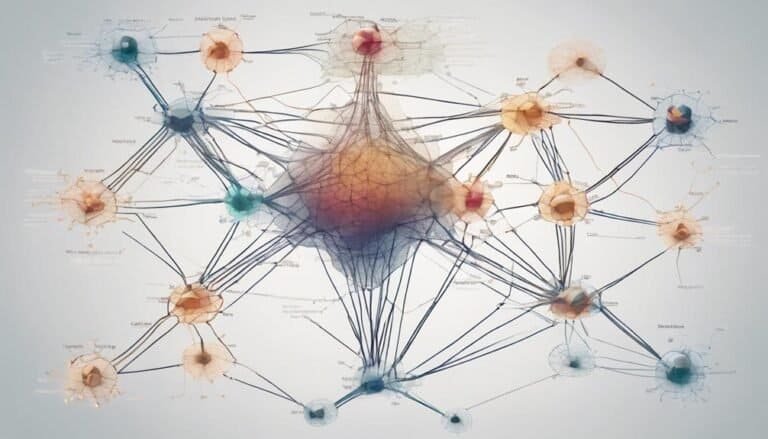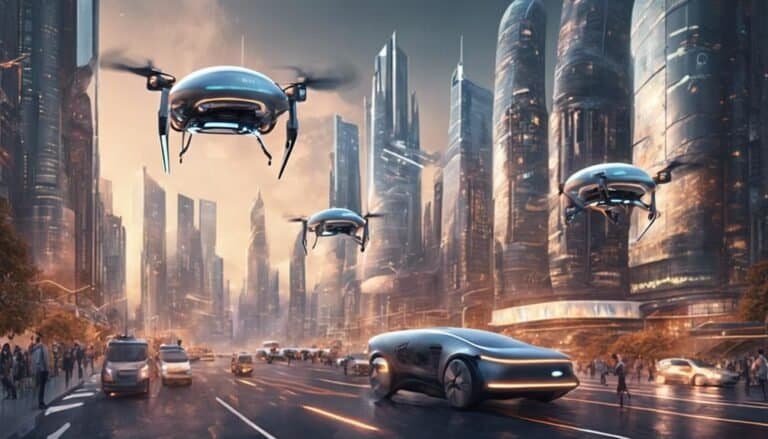The Role of AI in Environmental and Personal Sustainability: A Complete Introduction
With AI's advancements reshaping realms of sustainability, ponder the profound potential of artificial intelligence in fostering eco-friendly practices and individual wellness.
From optimizing energy consumption to tailoring healthcare solutions, AI holds promise in revolutionizing how we approach conservation and well-being.
Explore the intricate web of AI applications that transcend traditional boundaries, offering innovative avenues for promoting a greener planet and healthier lifestyles.
Uncover the intricate tapestry of AI's impact on environmental and personal sustainability, weaving together a narrative of progress and possibilities.
Key Takeaways
- AI drives energy efficiency and conservation through real-time monitoring and optimization.
- AI advances healthcare with personalized treatments and remote monitoring for proactive health management.
- AI transforms waste management by automating recycling processes and optimizing collection routes.
- AI revolutionizes urban development by reducing carbon emissions, optimizing traffic flow, and enhancing smart city integration.
AI Applications in Energy Efficiency
AI plays a crucial role in enhancing energy efficiency through its data-driven algorithms and predictive capabilities. Energy monitoring is vastly improved with AI, allowing for real-time analysis of energy consumption patterns and identification of areas where optimization is possible.
By utilizing smart appliances that are connected to AI systems, energy usage can be automatically adjusted based on demand and usage patterns, leading to significant energy savings.
Smart appliances equipped with AI technology can learn user behaviors and adjust settings to minimize energy consumption without sacrificing convenience. For example, AI-powered thermostats can analyze data on temperature preferences and occupancy to optimize heating and cooling schedules, resulting in reduced energy waste. Similarly, AI-enabled lighting systems can adjust brightness levels based on natural light availability and occupancy, ensuring that lights are only used when needed.
Furthermore, AI can facilitate the integration of renewable energy sources into existing energy grids by predicting energy production from sources like solar panels or wind turbines. By forecasting energy generation and demand, AI systems can optimize the use of renewable energy and reduce reliance on traditional fossil fuel sources, thereby promoting sustainability and reducing carbon emissions.
Enhancing Healthcare With AI
Improving healthcare outcomes is a critical focus area where the integration of artificial intelligence technology shows significant promise. AI-driven diagnostics have revolutionized the healthcare industry by enhancing the speed and accuracy of disease detection and treatment planning. Machine learning algorithms can analyze vast amounts of medical data to identify patterns and predict potential health issues with higher precision than traditional methods. This not only leads to early intervention but also helps in personalized medicine, where treatments are tailored to individual patients based on their unique health profiles.
Remote monitoring is another key area where AI is making a significant impact. Through wearable devices and sensors, individuals can now track their vital signs and health metrics in real-time. AI algorithms can analyze this data continuously to detect any anomalies or potential health risks, enabling timely interventions and proactive healthcare management. Remote monitoring is particularly beneficial for patients with chronic conditions, allowing healthcare providers to monitor their health remotely and intervene as needed, reducing the need for frequent in-person visits.
AI in Waste Management Solutions
Utilizing advanced technologies has become increasingly imperative in optimizing waste management solutions for sustainable environmental practices. AI plays a crucial role in revolutionizing waste management by enhancing waste sorting processes and recycling optimization.
In waste sorting, AI-powered systems use computer vision to identify and categorize different types of waste materials efficiently. This technology enables automated sorting of recyclables from non-recyclables, reducing contamination and increasing recycling rates. By accurately sorting waste, AI helps streamline the recycling process, making it more cost-effective and environmentally friendly.
Recycling optimization is another key area where AI excels. Machine learning algorithms analyze vast amounts of data to identify patterns and trends in recycling behaviors. This information is then used to optimize collection routes, improve recycling infrastructure, and develop targeted recycling campaigns. By harnessing the power of AI, waste management companies can enhance their recycling efforts, minimize waste generation, and promote a circular economy.
Personalized Nutrition Through AI
AI technology has revolutionized personalized nutrition by offering customized meal plans and dietary recommendations tailored to individual needs. Through advanced algorithms and data analysis, AI can provide precise health tracking assistance, helping you achieve your wellness goals effectively.
This data-driven approach ensures that your nutritional choices are optimized for your specific requirements, enhancing overall health outcomes.
Customized Meal Plans
By harnessing the power of artificial intelligence, individuals can now receive personalized nutrition plans tailored to their unique dietary needs and preferences. This advancement not only enhances personal health but also contributes to food sustainability by promoting more efficient use of resources. Customized meal plans generated through AI take into account factors such as allergies, cultural preferences, health goals, and activity levels.
Here are five key benefits of personalized nutrition plans:
- Reduction in food waste through precise ingredient quantities.
- Improved health outcomes by aligning meals with individual nutritional requirements.
- Enhanced convenience with tailored recipes and grocery lists.
- Increased adherence to dietary guidelines for long-term wellness.
- Promotion of sustainable farming practices by supporting local and seasonal produce.
Dietary Recommendations Based
Personalized nutrition plans created through artificial intelligence algorithms offer tailored dietary recommendations based on individual needs and preferences. By analyzing data on your dietary habits, health goals, and even genetic predispositions, AI can suggest personalized meal plans that align with your specific requirements.
This tailored approach not only enhances your overall well-being but also contributes to sustainable practices by promoting efficient food consumption. Additionally, AI can recommend food options that cater to personalized fitness goals, ensuring that your dietary intake supports your physical activities.
Moreover, AI algorithms can suggest products with sustainable packaging, helping you make environmentally conscious choices while maintaining a balanced diet. Embracing personalized nutrition through AI not only benefits your health but also promotes sustainability in your dietary habits.
Health Tracking Assistance
Utilizing advanced algorithms, tailored dietary recommendations are generated based on individual needs and preferences to enhance overall well-being and support sustainable practices. By incorporating AI into health tracking, individuals can benefit from personalized nutrition guidance that adapts to their unique requirements. This technology goes beyond generic advice, offering precise suggestions to optimize nutrition and promote better health outcomes.
Here are some key aspects of AI-driven health tracking assistance:
- Seamless integration with fitness tracking apps for a holistic approach to wellness.
- Real-time monitoring of nutritional intake to ensure balanced meals.
- Customized meal plans based on dietary restrictions or preferences.
- Analysis of trends to identify areas for improvement in nutrition.
- Continuous feedback loop for ongoing support and motivation in achieving wellness goals.
AI for Sustainable Agriculture
AI technology is revolutionizing sustainable agriculture by enabling precision farming techniques that optimize crop yields. Through data analytics and machine learning, farmers can make informed decisions on irrigation, fertilization, and pest control, leading to more efficient resource utilization.
These advancements in AI are crucial for addressing food security challenges and promoting environmentally friendly farming practices.
Precision Farming Techniques
When considering sustainable agriculture, incorporating precision farming techniques can significantly enhance productivity and environmental conservation efforts. Utilizing AI-driven tools such as soil monitoring systems and agricultural drones can revolutionize the way farmers manage their crops. Here are five key benefits of precision farming techniques:
- Optimized Resource Usage: Precision farming enables targeted application of fertilizers and pesticides, reducing waste.
- Enhanced Crop Health Monitoring: AI-powered systems can detect early signs of plant stress or disease for timely intervention.
- Increased Efficiency: Automation of tasks like irrigation and harvesting leads to time and cost savings.
- Environmental Impact Reduction: By minimizing chemical usage and optimizing water usage, precision farming promotes sustainability.
- Data-Driven Decision Making: Access to real-time data allows for informed choices, improving overall farm management.
Crop Yield Optimization
Incorporating AI technologies for crop yield optimization in sustainable agriculture involves leveraging data analytics and machine learning for enhanced productivity and resource efficiency. By analyzing vast amounts of data on soil quality, weather patterns, and crop health, AI can provide real-time insights for farmers to make informed decisions.
Through technology integration, AI systems can offer personalized recommendations for optimal planting times, irrigation schedules, and crop protection strategies, leading to increased yields and reduced resource wastage. Data analysis allows for the identification of patterns and trends that can further refine farming practices, ensuring sustainable production while minimizing environmental impact.
With AI-driven solutions, farmers can streamline operations, allocate resources more effectively, and contribute to the long-term viability of agriculture.
Advancements in Clean Water Access
Advancements in clean water access have significantly improved through innovative technologies and sustainable practices. Water purification technology has played a crucial role in ensuring access to clean water for communities worldwide. Additionally, community engagement initiatives have been instrumental in promoting awareness and encouraging sustainable water usage practices. Remote monitoring systems have enhanced water quality control, allowing for real-time data collection and analysis to ensure the safety of drinking water sources.
Here are five key advancements in clean water access:
- Implementation of advanced water purification technologies to remove contaminants and pathogens from water sources.
- Integration of community engagement programs to educate and involve local populations in water conservation and management efforts.
- Deployment of remote monitoring systems for continuous surveillance of water quality parameters and early detection of potential issues.
- Utilization of smart sensors and IoT devices to optimize water treatment processes and improve overall system efficiency.
- Adoption of sustainable water management practices to ensure long-term access to clean and safe drinking water for current and future generations.
AI-driven Transportation Innovations
Clean water access advancements have paved the way for AI-driven transportation innovations to revolutionize the efficiency and sustainability of modern transportation systems. Autonomous vehicles, a prominent feature of AI-driven transportation, have the potential to significantly reduce carbon emissions and traffic congestion. These vehicles can optimize routes, reduce idling time, and enhance overall traffic flow, leading to a more sustainable and efficient transportation network. Additionally, smart traffic management systems powered by AI can dynamically adjust traffic signals based on real-time conditions, further improving traffic flow and reducing emissions.
To provide a clearer picture, let's look at a comparison between traditional transportation systems and AI-driven transportation innovations:
| Aspect | Traditional Transportation | AI-Driven Transportation |
|---|---|---|
| Emissions | High | Reduced |
| Traffic Congestion | Common | Alleviated |
| Efficiency | Moderate | High |
As shown in the table above, AI-driven transportation innovations offer a significant improvement over traditional systems in terms of emissions, traffic congestion, and overall efficiency. By harnessing the power of AI in transportation, we can create a more sustainable and environmentally friendly way of moving people and goods.
Smart Cities and AI Integration
Smart cities are increasingly integrating AI technologies to enhance efficiency and sustainability across various urban systems. This integration of AI into urban infrastructure is revolutionizing the way cities are managed and operated. By leveraging AI, cities can optimize resource allocation, improve service delivery, and reduce environmental impact.
Here are some key ways in which AI is being integrated into smart cities:
- Real-time Urban Planning: AI algorithms analyze vast amounts of data to help urban planners make informed decisions in real-time, leading to more efficient land use and infrastructure development.
- Traffic Management Optimization: AI-powered systems monitor traffic patterns, predict congestion, and adjust signal timings to optimize traffic flow, reducing commute times and emissions.
- Predictive Maintenance: AI can predict when infrastructure elements like bridges, roads, or public transportation systems require maintenance, helping prevent costly breakdowns and ensuring safety.
- Energy Management: AI algorithms help cities optimize energy consumption by analyzing usage patterns and adjusting energy distribution in real-time, leading to reduced energy waste and lower carbon emissions.
- Waste Management Efficiency: AI systems can optimize waste collection routes, predict bin overflows, and identify recycling opportunities, improving overall waste management efficiency and promoting sustainability.
The integration of AI into smart cities is transforming urban living, making cities more sustainable, efficient, and livable.
AI for Climate Change Mitigation
AI technologies play a pivotal role in analyzing and addressing climate change challenges through data-driven solutions. One of the significant contributions of AI in climate change mitigation is improving climate modeling accuracy. AI algorithms can process vast amounts of data from various sources to enhance the precision of climate models, enabling better predictions and informed decision-making.
Furthermore, AI plays a crucial role in reducing carbon footprints by optimizing processes across industries. Machine learning algorithms can identify inefficiencies in energy consumption and suggest improvements, leading to reduced emissions and resource conservation. Emissions monitoring is another area where AI excels. By analyzing real-time data from sensors and satellites, AI can detect sources of pollution promptly, aiding in the enforcement of environmental regulations and the implementation of corrective measures.
In the realm of renewable energy integration, AI offers solutions to maximize the efficiency and output of clean energy sources. Through AI-powered systems, renewable energy generation can be optimized based on weather patterns, demand fluctuations, and grid conditions, ensuring a smoother transition towards sustainable energy practices.
Improving Mental Health With AI
AI has shown promise in providing therapy benefits and support for emotional well-being, potentially revolutionizing mental health care.
By analyzing vast amounts of data and patterns, AI can offer personalized interventions and coping mechanisms tailored to individual needs.
This data-driven approach has the potential to enhance accessibility and effectiveness of mental health support services.
AI Therapy Benefits
Utilizing advanced technology in mental health interventions has shown promising results in enhancing well-being and addressing various psychological challenges. AI counseling services offer a convenient and accessible way to seek emotional support. Virtual therapy sessions provide flexibility and privacy, catering to individual needs. AI tools can analyze vast amounts of data to personalize therapy plans for better outcomes.
Chatbots offer immediate responses, ensuring continuous support for mental health concerns. Additionally, AI algorithms can detect patterns in behavior and provide insights into emotional wellness trends. These advancements in AI therapy showcase significant potential in improving mental health benefits and overall well-being.
Emotional Well-being Support
Enhancing emotional well-being and mental health through innovative AI technologies demonstrates significant potential for improving overall psychological wellness. Emotional support robots, powered by AI, offer companionship and empathy, aiding individuals in managing stress and loneliness. These robots provide a non-judgmental space for users to express their emotions freely, promoting emotional release and relaxation.
AI counseling services utilize advanced algorithms to analyze user input and offer tailored advice and coping strategies. By leveraging machine learning and natural language processing, these services can provide personalized support at scale, making mental health resources more accessible. The integration of AI in emotional well-being support not only complements traditional therapy methods but also addresses the growing need for mental health assistance in a technologically driven world.
Conclusion
In conclusion, AI serves as the guiding compass in navigating the vast sea of sustainability challenges. Like a skilled captain steering a ship through turbulent waters, AI illuminates the path towards a greener future.
With its analytical prowess and data-driven insights, AI empowers us to make informed decisions, leading us towards a more sustainable and harmonious world.
Embrace the transformative power of AI, and together, we can chart a course towards a brighter tomorrow.







